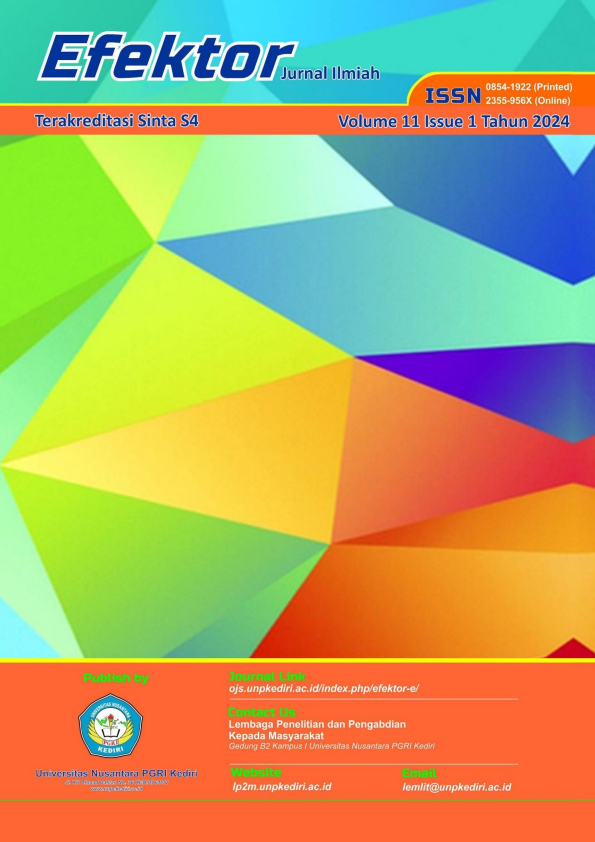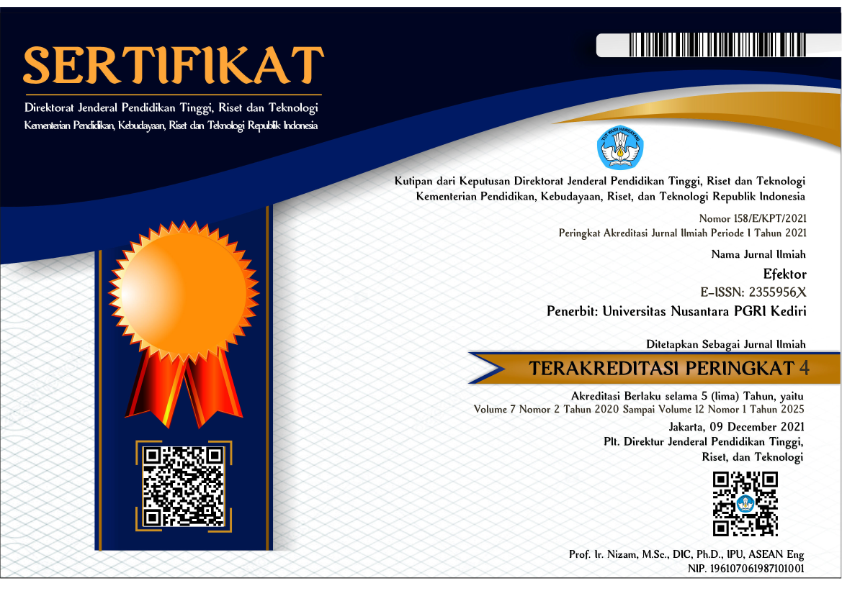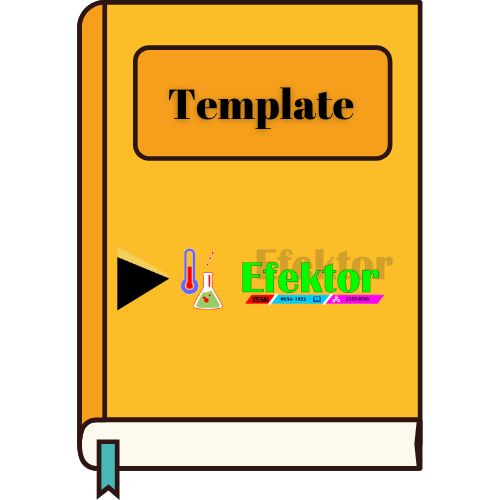Elementary School Students’ Challenges in Learning English: A Reflection For Merdeka Curriculum from A Rural Area in West Kalimantan
DOI:
https://doi.org/10.29407/e.v11i1.22152Keywords:
challenges, English language teaching, elementary schoolAbstract
English is a foreign language taught in educational units throughout Indonesia. Therefore, in learning English, of course, students face a variety of challenges. This study aims to discover the challenges students of SDN 14 Sungai Ambawang face in learning English and to identify any factors that influence the challenges students face in learning English. The research method used is qualitative, with a case study research design. Data collection is done through observation, questionnaires, and interviews. Data analysis techniques applied interactive models, including data collection, condensation, display, and drawing and verifying conclusions. This study found that several challenges and factors cause elementary school students to learn English as a foreign language, namely difficulty in understanding, writing, listening, and pronouncing words. The causes include a lack of self-confidence, a lack of support from the neighborhood school, a lack of home support, and a lack of learning facilities. Future research could expand the broader context of English teaching as a compulsory subject.
References
Agung, A. S. N., & Surtikanti, M. W. (2020). Students’ Perception of Online Learning during COVID-19 Pandemic: A Case Study on the English Students of STKIP Pamane Talino. SOSHUM : Jurnal Sosial Dan Humaniora, 10(2), 225–235. https://doi.org/10.31940/soshum.v10i2.1316
Akmalia, N. W., Muttaqien, N., & Latifah, N. (2022). Analisis Kesulitan Menulis Siswa Kelas III dalam Mata Pelajaran Bahasa Inggris di SD Negeri Pondok Bahar 6 Kota Tangerang. Jurnal Pendidikan Tambusai, 6, 13636–13644.
Al-Khalidi, I. S. I. (2020). Main Challenges Encountered by Students in Learning English as a Foreign Language. International Journal of Research in Social Sciences and Humanities. 10, 33–41. https://doi.org/10.37648/ijrssh.v10i04.004
Anggraena, Y., Felicia, N., G, D. E., Pratiwi, I., Utama, B., Alhapip, L., & Widiaswati, D. (2021). Kajian Akademik Kurikulum Untuk Pemulihan Pembelajaran. Pusat Kurikulum Dan Pembelajaran Badan Standar, Kurikulum, Dan Asesmen Pendidikan Kementerian Pendidikan, Kebudayaan, Riset, Dan Teknologi, 123.
Anggrarini, N. (2019). Exploring young learners teachers competency and challenges in teaching. Wiralodra English Journal. 3(1), 229–238.
Creswell, J. W., & Creswell, J. D. (2018). Mixed Methods Procedures. In Research Design: Qualitative, Quantitative, and Mixed Methods Approaches.
Elvinda, R., & Syahrul. (2022). The Students’ Difficulties in English Learning during the Covid-19 pandemic in the eighth grade of SMPN 1 Mapat Tunggul. Jurnal Pendidikan Tambusai, 66(2), 12921–12931.
Era, P., Sakkir, G., & Rukmana, N. S. (1835). Challenges Faced by Students in Learning English (Post-Pandemic Era) s. 111–118.
Febriani, A. (2023). Kesulitan Pelafalan Kosakata Bahasa Inggris Siswa Sekolah Dasar. 2, 473–478.
Habsyi, F. Y. (2020). Pengaruh fasilitas belajar terhadap prestasi belajar siswa SMA Nusantara Tauro. Jurnal Pendidikan Dan Ekonomi, 2(1).
Harlina, H., & Yusuf, F. N. (2020). Tantangan Belajar Bahasa Inggris di Sekolah Pedesaan. Jurnal Penelitian Pendidikan, 20(3), 325–334. https://doi.org/10.17509/jpp.v20i3.28191
Hossain, M. A. (2018). Difficulties of Learning English Language at the Secondary Level: A Case Study of Thakurgaon District. Journal of Education and Training, 5(2), 165. https://doi.org/10.5296/jet.v5i2.13500
Hulukati, W. (2015). Peran Lingkungan Keluarga Terhadap Perkembangan Anak. Jurnal Musawa, 7(2).
Islahuddin, M. (2023). International Journal of Multicultural and Multireligious Understanding Teaching English to Young Learners : A Literature Review. 500–513.
Komang, N., Widayanti, A., & Suarnajaya, I. W. (2021). Students Challenges in Learning English Online Classes. 9(1), 77–84.
Larasaty, G., Anggrarini, N., Efendi, N., & Wiralodra, U. (2022). Room of Civil Society Development " Fun English " sebagai Kegiatan dalam Pengajaran Bahasa Inggris untuk Anak Sekolah Dasar di Indramayu. 1(4), 96–102.
Latief, A. (2023). PerananPentingnya Lingkungan Belajar Bagi Aanak 7(2), 61–66.
Lena, M. S. (2023). Analisis Kesulitan Siswa dalam Pembelajaran Bahasa Inggris di Sekolah Dasar. 1(3).
Marbun, & Vega. (2023). The students’ difficulties in learning english on eighth grade in SMPN 7 Tarakan. NBER Working Papers, 2(1), 119.
Miles, M. B., Huberman, A. M., & Saldana, J. (2018). Qualitative Data Analysis: A Methods Sourcebook. SAGE Publications.
Muhtarom, M., & Maghfiroh, A. (2022). Student Difficulties in English Learning During Limited Ptm Period. International Journal of Research on English Teaching and Applied Linguistics, 2(2), 10–14. https://doi.org/10.30863/ijretal.v2i2.2450
Musriani, V. (2023). Penyebab Perilaku Kurang Percaya Diri Saat Pembelajaran Bahasa Indonesia Siswa Kelas Vii Smp Muhammadiyah 4 Tanggul. Self-Esteem and Foreign Language Learning, January 2007.
Nur, M., Yusuf, A., Astutik, Y., & Megawati, F. (2023). Mufidah Nur Aliyyah Yusuf. 11(1), 12–23.
Pamungkas, Z. B. (2021). Peran pendidikan bahasa inggris untuk anak di usia “ golden age. Islamic Elementary School (IES), 1(2).
Purandina, I. P. Y. (2022). Kecemasan Berbahasa Asing Anak Sekolah Dasar Dalam Pembelajaran Bahasa Inggris. Edukasi: Jurnal Pendidikan Dasar, 3(1). https://doi.org/10.55115/edukasi.v3i1.2297
Putri, A., & Febriani, M. (2023). Tantangan Berbicara Bahasa Inggris Pada Siswa Sekolah Dasar. 2, 510–516.
Rezeki, T. I., & Sagala, R. W. (2021). The Students’ Difficulties in Learning English At Madrasah Ibtidaiyah Teacher Education Study Program. Jurnal Serunai Bahasa Inggris, 13(1), 31–35. https://doi.org/10.37755/jsbi.v13i1.342
Sari, C. P. (2018). Faktor-Faktor Penyebab Rendahnya Minat Membaca Siswa Kelas IV. Jurnal Pendidikan Guru Sekolah Dasar, 7(32).
Serviati, O., Khosmas, F. Y., & Wiyono, H. (2021). Pengaruh Lingkungan Sekolah Terhadap Motivasi Belajar Peserta Didik Di MTs Negeri 2 Pontianak. Jurnal Pendidikan Dan Pembelajaran Khatulistiwa, 10(3).
Sintadewi, N. M. D., Artini, N. P. J., & Febryan, I. (2020). Analysis of English Learning Difficulty of Students in Elementary School. International Journal of Elementary Education, 4(3), 431. https://doi.org/10.23887/ijee.v4i3.28524
SUCANDRA, S., Budiman, M. A., & Fajriyah, K. (2022). Analisis Kesulitan Penguasaan Kosakata Pembelajaran Muatan Lokal Bahasa Inggris Pada Siswa Kelas Iv Di Sd Plus Latansa Kabupaten Demak. Wawasan Pendidikan, 2(1), 71–80. https://doi.org/10.26877/wp.v2i1.9664
Suhasri, A. H., Astuti, N. J., & Suryana, E. (n.d.). Perkembangan Bahasa dan Sosial Pada Fase Anak Usia Sekolah. 120–126.
Sultra, E. D., & Baharudin, B. (2020). Analysis of Student’S Difficulties in Learning English At Sma Negeri 1 Batauga. English Education Journal, 124, 65–75. https://doi.org/10.55340/e2j.v6i2.364
Suputra, P., Eka, D., Budasi, I. gede, & Paramarta, I. made sut. (2021). Tantangan pembelajaran di sekolah dasar di desa pada masa ppkm di bali. 2021, 153–162.
Susanto, A., Education, S., Program, S., Riau, K., Faculty, H., & Riau, K. (2020). The Challenges of Learning English As a Foreign. Inovish Journal, 5(1).
To, S., & Sari, F. M. (2022). An Exploration o f University Students ’ Challenges in Learning English as Foreign Language during Covid-19 Pandemic Universitas Teknokrat Indonesia. 20(2), 113–122.
Uzer, Y. (2020). Strategi Pembelajaran Bahasa Inggris Di Tingkat Dasar. PERNIK : Jurnal Pendidikan Anak Usia Dini, 3(1), 97–106. https://doi.org/10.31851/pernik.v3i2.4953
Weda, S., Sakkir, G., Elsa, A., & Sakti, F. (2022). Tantangan Belajar Mahasiswa Bahasa Inggris dalam Menghadapi Perubahan Kurikulum Merdeka Belajar Kampus Merdeka ( MBKM ) di Masa New Normal. 65–74.
Wulandari, C., Surtikanti, M. W., & Agung, A. S. S. N. (2020). a Case Study of Internal and External Factors on the Difficulties in Learning English. JOEEL: Journal of English Education and Literature, 1(2), 43–48. https://doi.org/10.38114/joeel.v1i2.81
Yulizar, I., & Hasibuan, S. A. (2022). Mengapa Bahasa Inggris Menjadi Mata Pelajaran Wajib di Indonesia. In Tarbiyah bil Qalam : Jurnal Pendidikan Agama dan Sains (Vol. 6, Issue 2, pp. 25–38).
Downloads
Published
Issue
Section
License
Authors who publish with this journal agree to the following terms:
- Copyright on any article is retained by the author(s).
- The author grants the journal, the right of first publication with the work simultaneously licensed under a Creative Commons Attribution License that allows others to share the work with an acknowledgment of the work’s authorship and initial publication in this journal.
- Authors are able to enter into separate, additional contractual arrangements for the non-exclusive distribution of the journal’s published version of the work (e.g., post it to an institutional repository or publish it in a book), with an acknowledgment of its initial publication in this journal.
- Authors are permitted and encouraged to post their work online (e.g., in institutional repositories or on their website) prior to and during the submission process, as it can lead to productive exchanges, as well as earlier and greater citation of published work.
- The article and any associated published material is distributed under the Creative Commons Attribution-ShareAlike 4.0 International License













